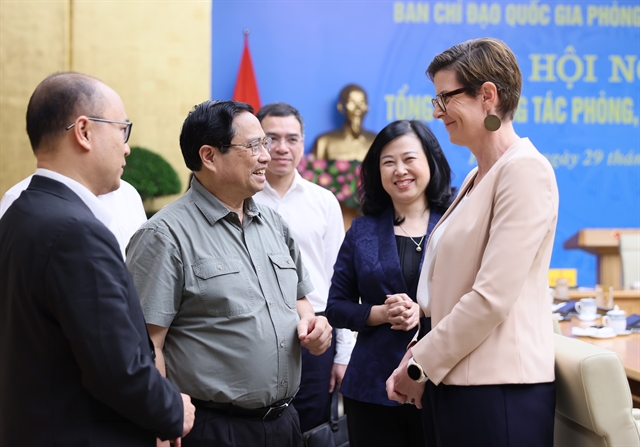 Society
Society


|
| Prime Minister Phạm Minh Chính speaks to Dr Angela Pratt, World Health Organization Representative in Việt Nam on the sidelines of the conference. VNA/VNS Photo |
HÀ NỘI - During a national conference on Sunday to review the three-year prevention and control over COVID-19, Prime Minister Phạm Minh Chính highlighted decisive factors of Việt Nam’s success, including 5K principle, vaccine, testing, treatment, technology and public awareness.
He affirmed that with the aim of putting public health and lives first, Việt Nam has overcome COVID-19, a dangerous pandemic at a global scale, causing serious consequences, both physically and mentally, to human health, and socio-economic development of countries around the world.
The Cabinet leader recalled “the most challenging periods with worries and concerns in an unprecedented pandemic situation”.
“Combating the pandemic at that time was extremely difficult on all fronts when we had nothing else at hand, no vaccine, no test kit, except for the healthcare system. The system then could meet the requirements under normal conditions but was unable to meet the requirements under abnormal or medical emergency conditions," he said.
Việt Nam launched the vaccine strategy with three important factors – the vaccine fund, vaccine diplomacy and the mass free vaccination campaign.
All diplomatic missions abroad called for vaccine donations by all means from aids or purchasing channels. Thanks to that effort, about half of the hundreds of millions of vaccine doses that Việt Nam has received were from aid sources, he said.
Sharing experience from the three-year COVID-19 combat, the health ministry said it is important to improve the capacity of the healthcare system, preventive healthcare, and grassroots healthcare systems to ensure they meet requirements in the outbreaks or in pandemic emergencies. At the same time, relevant agencies need to always prepare plans with guaranteed conditions to meet people's medical service needs early, from afar, right at the facility.
PM Chính ordered the healthcare sector to strengthen investment in preventive health system, grassroots health care, improving the capacity to care for and protect public health and effectively preventing and controlling the pandemic.
The Ministry of Health needs to develop a national plan to respond to pandemics or future pandemic emergencies, he said.
The healthcare sector was also urged to do biomedical research, develop domestic pharmaceutical industry, vaccines, biological products, medical equipment and traditional medicine to stay active in the pandemic prevention and control.
Dr Angela Pratt, World Health Organization Representative in Việt Nam, said Việt Nam’s response to COVID-19 is a model for other countries.
She praised Việt Nam for its strong capacity for early detection of cases, speedy investigation and response, and an effective combination of border measures and social restrictions.
Despite Việt Nam’s formalisation of COVID-19 re-classification from Group A infectious disease to group B, she said: “We cannot completely relax. The COVID-19 virus continues to circulate around the world, and while this is the case, there is always a risk of new variants and a resurgence of cases.”
“As strong as the country’s response to the pandemic was, just like every other country, there are lessons Việt Nam can take from COVID-19 to be better prepared for the next health emergency, whenever it comes.”
She recommended that Việt Nam ensure reliable systems in place for timely procurement and, where possible, domestically manufactured medicines, vaccines and diagnostics, including through mRNA technology transfer.
“We need to continue integrating COVID-19 vaccination into the routine vaccination system, focusing on the highest-risk groups with the evolving expert advice,” she said.
Việt Nam recorded the first COVID-19 case on January 23, 2020.
On March 31, 2020, the whole country started a 15-day quarantine due to the widespread of the SARS-CoV-2.
On April 27, 2021, after more than one year of COVID-19 fighting, Việt Nam faced the fourth wave with the highly virulent Delta strain detected in 62 out of 63 provinces and cities, causing extremely serious consequences, especially in HCM City.
On October 11, 2021, with a fairly high vaccine coverage rate, the Government issued Resolution No. 128/NQ-CP, marking the nation’s strategic shift towards safe, flexible adaptation and effective control of the pandemic.
COVID-19 was officially classified from group A to group B infectious disease in Việt Nam on October 20, 2023. VNS